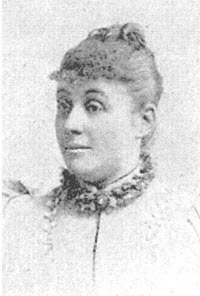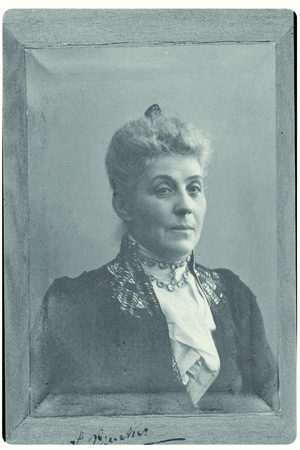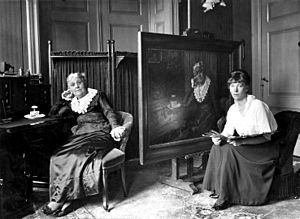Wilhelmina Drucker facts for kids
Wilhelmina Drucker (born Wilhelmina Elizabeth Lensing in Amsterdam, 30 September 1847 – died Amsterdam, 5 December 1925) was an important Dutch politician and writer. She was one of the first Dutch feminists. Feminists are people who believe men and women should have equal rights and opportunities. Wilhelmina was also known by her pen names Gipsy, Gitano, and E. Prezcier.
Early Life and Activism
Wilhelmina grew up in tough times. Her mother was a seamstress, and her father was a wealthy banker. However, her father did not marry her mother or officially recognize Wilhelmina and her sister as his children. This meant they faced many challenges.
Wilhelmina followed her mother's profession as a seamstress. As she grew older, she started attending meetings for groups that wanted to make society fairer. These included groups focused on workers' rights and the right to vote for everyone. She was especially influenced by socialism, which is a belief that society should be more equal for all people.
Wilhelmina used her own experiences to understand the problems women faced. She realized that society's rules were often unfair to women. She even wrote a book using a pen name. It criticized how her father treated her family differently from his other, richer family.
Fighting for Women's Rights
Wilhelmina took her half-brother, who was a politician, to court. He had received money from their father. Wilhelmina won the case in 1888. This victory gave her financial freedom.
Right after this, she and other women started a weekly magazine called De Vrouw (The Woman). It was for women and girls. In 1889, Wilhelmina founded the Vrije Vrouwen Vereeniging (VVV), which means Free Women's Association. This group later became the Women's Rights Association in 1894.
In 1891, Wilhelmina represented the VVV at a big international meeting in Brussels. This meeting was for socialist groups from different countries. She worked with delegates from Germany, Austria, and Italy. They asked for a rule that all socialist parties should fight for full legal and political equality for men and women. The meeting agreed to this important rule.
Spreading the Message
In 1893, Wilhelmina and her friend Dora Schook-Haver started another weekly magazine called Evolutie (Evolution). This magazine was published for many years, until 1926. Wilhelmina also traveled all over the Netherlands, giving speeches. She helped set up several trade unions for women workers.
In 1897, she joined the Vereeniging Onderlinge Vrouwenbescherming (VOV). This group helped unmarried mothers and their children. Wilhelmina believed the VOV should be a strong group that united all women. She wanted them to work together publicly for women's rights. She also wanted them to fight against unfair laws and old-fashioned ideas. Her ideas helped create later activist groups.
Because she strongly called for action to achieve equality, Wilhelmina earned nicknames like 'Ijzeren' (Iron) or 'Dolle' (Mad) Mina. These names became even more popular after she publicly burned women's corsets. This was a symbolic act to show women's freedom from restrictive clothing and old rules. A famous feminist group started in 1970 was named Dolle Mina in her honor. They also held a public event where they burned bras to celebrate women's liberation.
See also
 In Spanish: Wilhelmina Drucker para niños
In Spanish: Wilhelmina Drucker para niños
 | Mary Eliza Mahoney |
 | Susie King Taylor |
 | Ida Gray |
 | Eliza Ann Grier |




